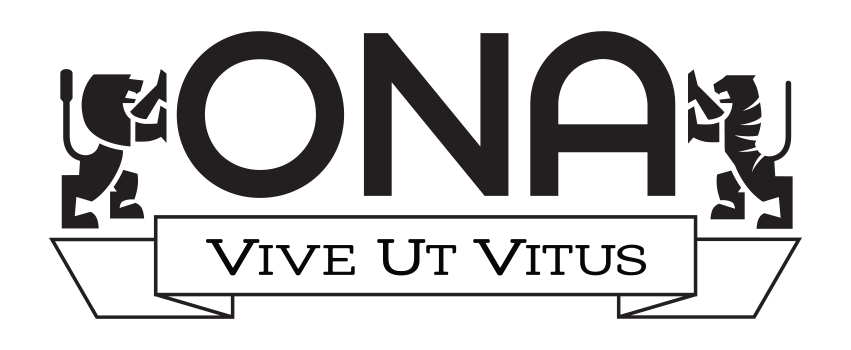Understanding the deep connection between mental and physical health is essential for overall well-being. At Ona Treatment Center, we are committed to exploring the ways in which mental wellness, stress management, and emotional health can significantly impact physical recovery.
Join us as we examine holistic approaches to healing and share inspiring success stories and cutting-edge research findings.
How Does Mental Health Affect Your Body?
The connection between mental and physical health is undeniable, and mounting research supports this interrelationship. High levels of stress can lead to severe physical health issues. Chronic stress, for instance, exerts a general immunosuppressive effect and increases the risk of developing conditions such as heart disease, diabetes, and gastrointestinal disorders.
Stress and Your Physical Health
Managing stress effectively is not just about mental peace; it’s vital for your body. Engaging in relaxation techniques such as deep breathing exercises, meditation, or progressive muscle relaxation can significantly reduce stress levels. The Journal of Clinical Psychology found that these practices can lower anxiety and promote a state of calmness, which positively impacts physical health. Regular physical activity like yoga or tai chi has also been shown by Harvard Health Publishing to improve mood and reduce stress, further benefiting your physical well-being.
Mental Wellness and Physical Conditions
A strong mental state can have a profound impact on physical conditions. For example, mindfulness practices have been demonstrated to reduce symptoms in people with chronic pain. Studies reported by the National Institutes of Health highlight that mindfulness meditation can help people manage anxiety, stress, depression, pain, or symptoms related to these conditions.
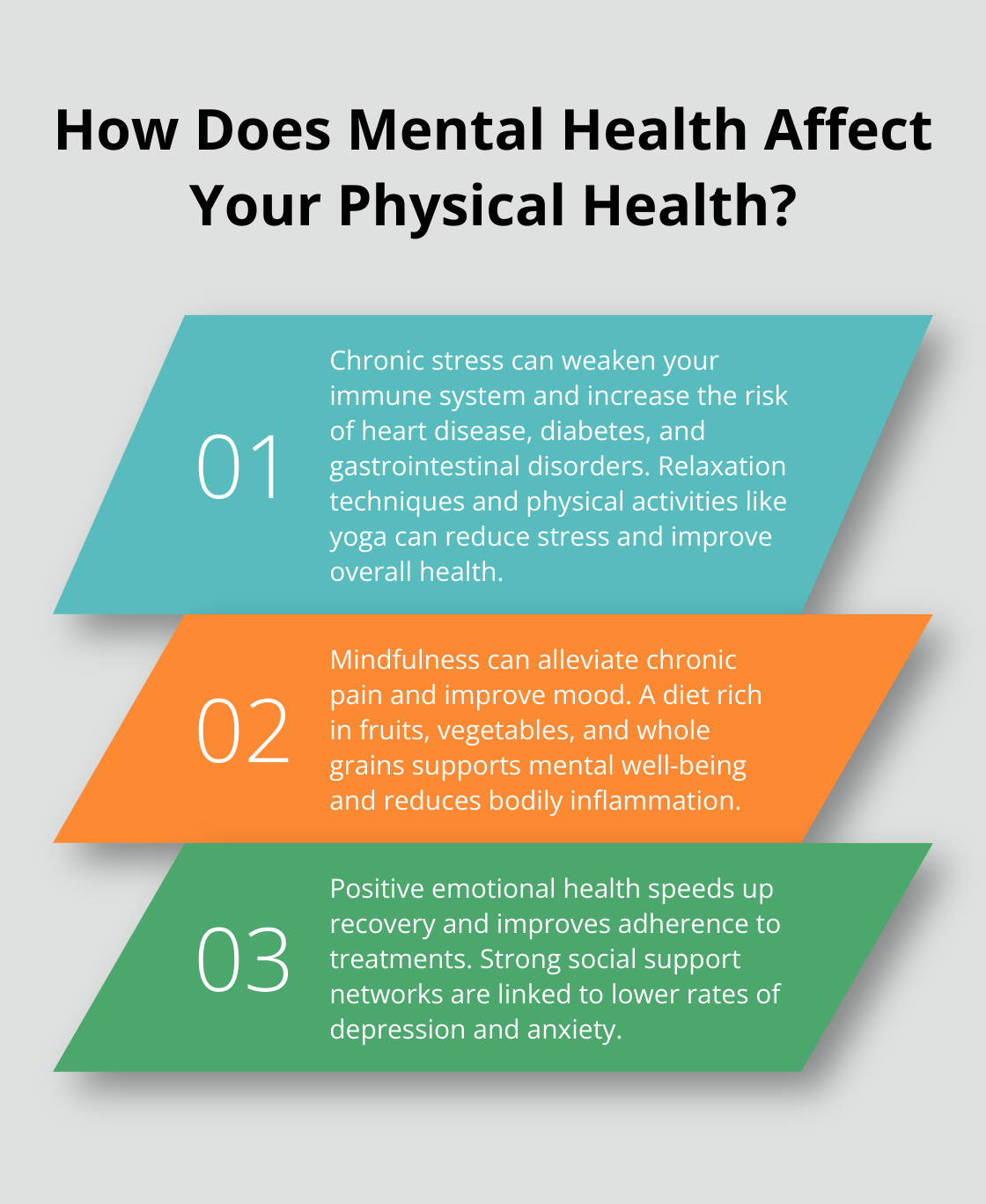
Similarly, maintaining a healthy diet can boost mental health and, consequently, physical health. Research from Nutritional Neuroscience connects diets rich in fruits, vegetables, and whole grains with better mental well-being and reduced inflammation in the body. This relationship underlines the importance of a balanced diet, not just for physical sustenance but for mental clarity and emotional balance.
Emotional Well-being in Recovery
Emotional health is crucial for the recovery process. Patients who maintain a positive emotional state are often more compliant with treatment regimens and demonstrate faster recovery rates. A study in World Psychiatry indicates that individuals with strong social support networks have lower rates of depression and anxiety, leading to better overall health outcomes.
Incorporating practices such as journaling, which enhances self-awareness and emotional expression, can also aid recovery. Emotional intelligence, the ability to manage and utilize emotions effectively, has been shown by the Harvard Business Review to improve mental resilience and coping strategies, making the recovery process smoother and more sustainable.
In summary, addressing mental health is not just beneficial but essential for physical health. Strategies such as effective stress management, maintaining mental well-being through mindfulness and diet, and nurturing emotional well-being significantly contribute to overall physical recovery and health.
How Can You Heal Holistically?
Holistic healing involves combining traditional and alternative medicine to address physical and mental health comprehensively. This approach not only enhances recovery but also promotes long-term well-being.
Integrating Traditional and Alternative Medicine
Incorporating both conventional medicine and alternative treatments can yield better results for managing chronic conditions. For instance, patients with migraines have reported significant improvements when combining medication with acupuncture. Evidence-based research shows that adding acupuncture to traditional care can reduce the frequency and severity of migraines by up to 50%.
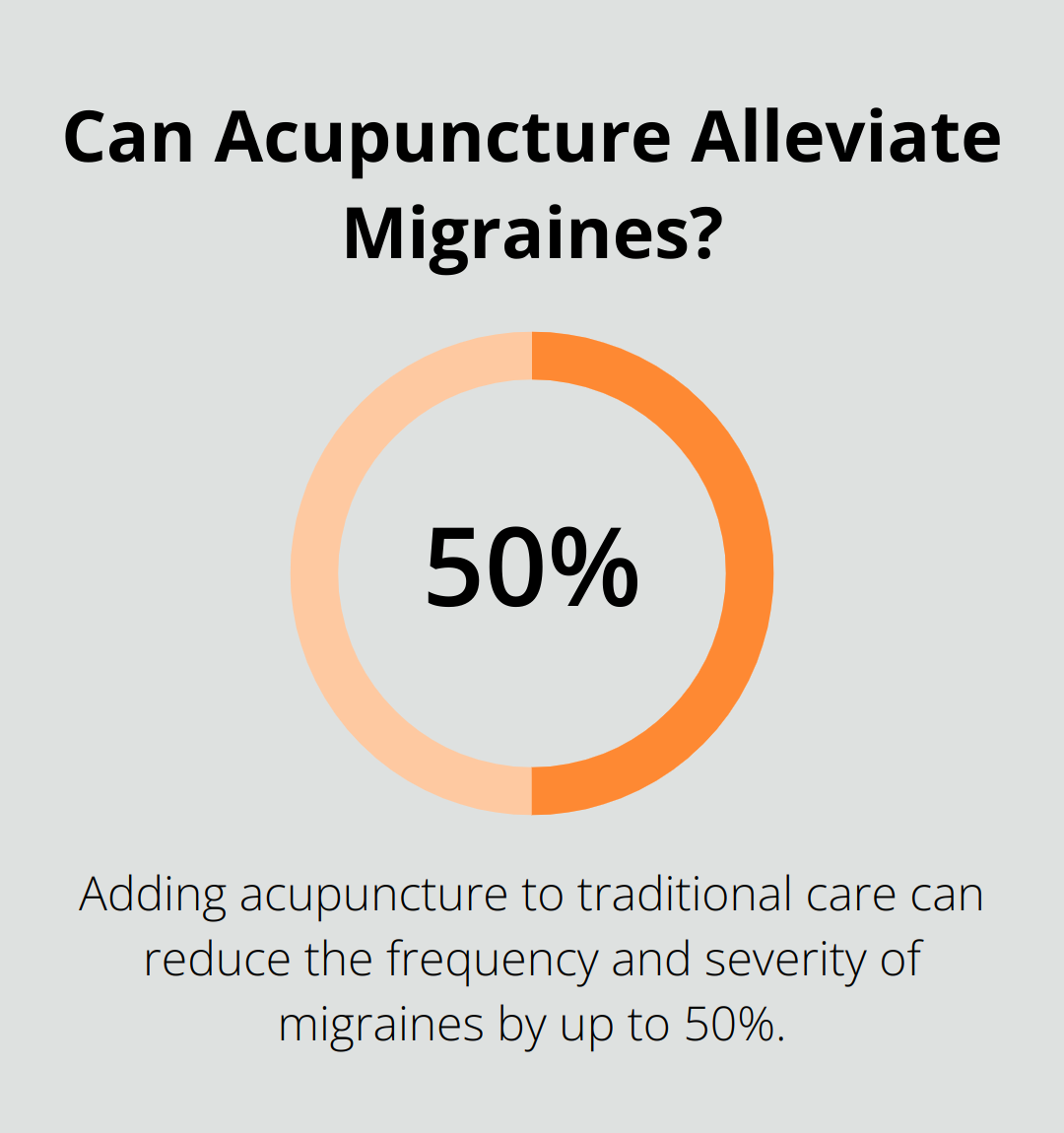
Similarly, those suffering from anxiety or depression may benefit from integrating cognitive behavioral therapy (CBT) with mindfulness practices. Studies indicate that mindfulness can be as effective as CBT in reducing symptoms of anxiety and depression. This dual approach creates a more robust path to mental health.
Integrative medicine also emphasizes personalized nutrition plans. Specific dietary adjustments can have substantial effects on conditions like epilepsy. A ketogenic diet, which is high in fats and low in carbohydrates, has been used effectively to manage and reduce the frequency of seizures in some patients.
Benefits of Mindfulness and Meditation
Mindfulness and meditation are powerful tools for healing the mind and body. Research from the National Institutes of Health reveals that mindfulness meditation significantly reduces symptoms of PTSD, anxiety, and chronic pain.
For anyone looking to alleviate stress and improve sleep, mindfulness practices can be highly beneficial. Meditation techniques that focus on breathing and body awareness can help manage insomnia and enhance sleep quality. Harvard studies have also found that these techniques lower systolic and diastolic blood pressure, contributing to cardiovascular health.
Practicing mindfulness isn’t complicated. Start with just five minutes a day, focusing on your breath or guided imagery. Gradually increase the duration as you become more comfortable. This simple practice can lead to substantial improvements in both mental and physical health.
Importance of Nutrition and Exercise
Nutrition and exercise play critical roles in holistic healing. Consuming a diet rich in antioxidants and phytonutrients, found in fruits and vegetables, helps maintain brain health and reduces inflammation. Research in Nutritional Neuroscience shows that such diets can lower the risk of mental decline and improve overall well-being.
Exercise is equally important. Regular physical activity, such as brisk walking, has been linked to improved mental health, mood, and stronger immune function. The Centers for Disease Control and Prevention (CDC) recommend at least 150 minutes of moderate aerobic activity weekly. Engaging in physical activities that you enjoy—whether it’s yoga, swimming, or gardening—can make it easier to maintain this routine.
Combining good nutrition with regular exercise not only supports physical health but also enhances mental clarity and emotional stability. This integrated approach is vital for anyone looking to achieve holistic health and well-being.
What Have We Learned from Holistic Healing?
Holistic healing, combining traditional and alternative medicine, consistently demonstrates its effectiveness through robust research and compelling case studies. These real-life success stories offer practical insights into the tangible benefits of an integrated approach to health.
Case Studies on Holistic Healing
Consider the case of John, a 48-year-old with chronic migraines. By integrating conventional medication with acupuncture, John experienced a reduction in migraine frequency and severity. This improvement allowed him to return to work regularly and regain a quality of life he thought was lost. Similar stories are common, showing the power of combining different treatment modalities.
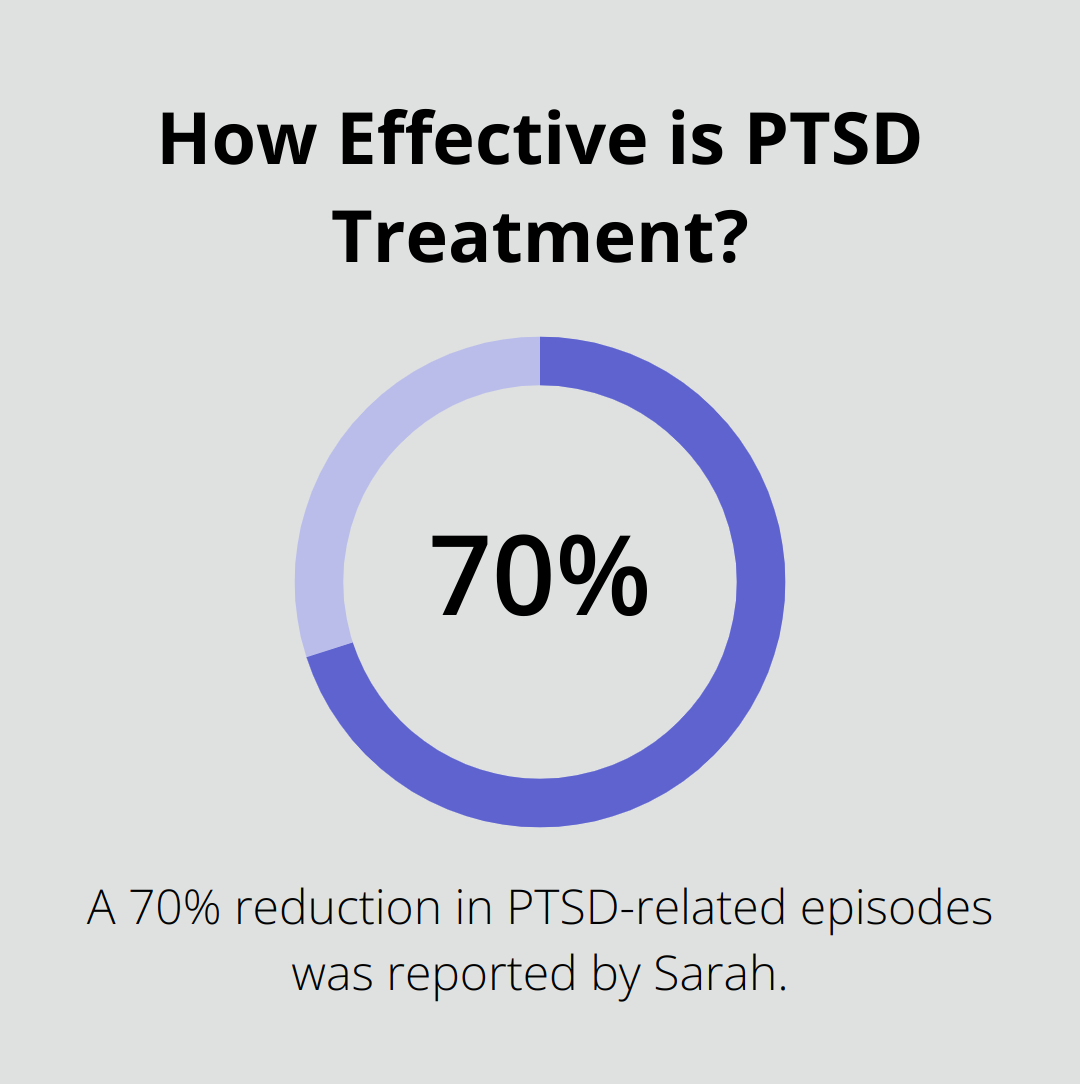
Another compelling case is Sarah, a 34-year-old dealing with PTSD. She combined mindfulness meditation with cognitive behavioral therapy (CBT) and saw a remarkable decrease in her symptoms. Within a year, Sarah reported a 70% reduction in PTSD-related episodes, corroborating findings from studies that highlight the equivalence of mindfulness to CBT for anxiety and depression treatment.
Research Supporting the Mind-Body Connection
A growing body of research backs the efficacy of holistic approaches. For example, a study by the National Institutes of Health revealed that mindfulness meditation significantly reduces symptoms of anxiety, depression, and chronic pain. Another study showed that patients integrating nutrition plans into their treatment for epilepsy experienced a notable decrease in seizure frequency. This underscores the profound impact of dietary choices on neurological health.
Research from Harvard found that physical activities like yoga and tai chi not only improve mood but also enhance immune function and reduce stress. The same study demonstrated these activities’ effectiveness in reducing systolic and diastolic blood pressure, highlighting the interconnectedness of physical exercise and cardiovascular health.
Testimonials from Patients and Practitioners
Patients and healthcare practitioners consistently report positive outcomes with holistic approaches. Lisa, a 56-year-old recovering from surgery, incorporated meditation and a personalized nutrition plan into her recovery. Within three months, her recovery metrics, including pain management and mobility, were significantly better than average postoperative recovery times.
Healthcare providers, too, see the benefits. Dr. James Mitchell, an expert in integrative medicine, often combines traditional treatments with therapies such as acupuncture and tailored nutrition plans. His patients show improved compliance and quicker recovery times, validating the effectiveness of a holistic approach.
These real-world examples and research findings collectively reinforce the significant advantages of holistic healing. By embracing an integrative approach, patients can experience more comprehensive and sustainable health improvements.
Conclusion
Understanding the profound connection between mental and physical health is crucial for holistic healing. We have explored how stress management, mental wellness, and emotional health significantly influence physical recovery. Research supports that chronic stress can lead to severe physical conditions, but effective management techniques such as deep breathing, meditation, and progressive muscle relaxation can alleviate these effects.
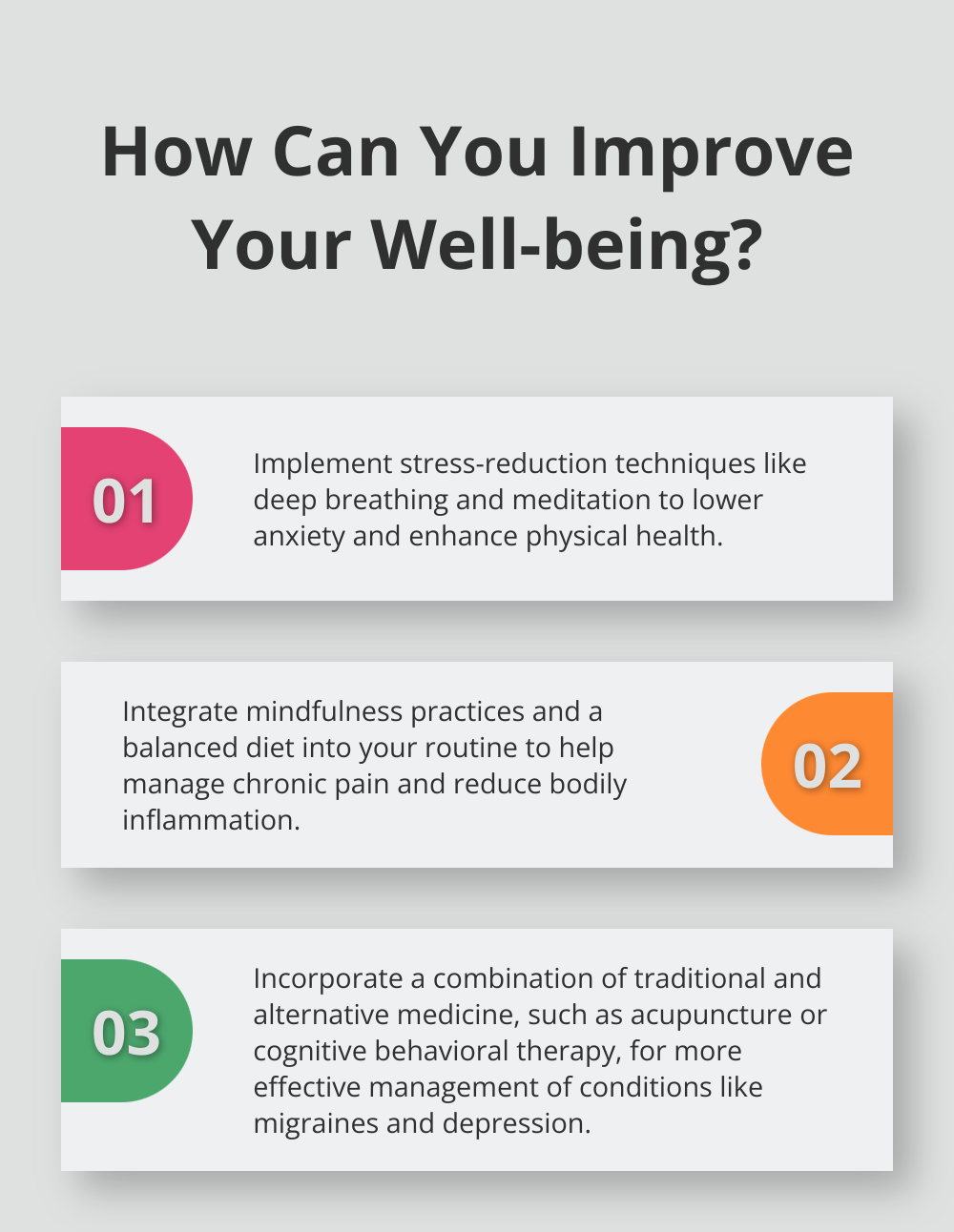
Incorporating mindfulness practices can reduce symptoms of chronic pain, anxiety, and depression, underscoring the importance of mental wellness in physical health. A balanced diet rich in fruits, vegetables, and whole grains not only promotes physical health but also boosts mental well-being. Emotional well-being plays a vital role in recovery, with strong social support networks contributing to lower rates of depression and anxiety.
Holistic healing integrates traditional and alternative medicine for comprehensive care. Combining conventional treatments with practices like acupuncture and cognitive behavioral therapy enhances outcomes for chronic conditions. Mindfulness meditation offers significant benefits for various mental health conditions, and personalized nutrition plans can have substantial effects on neurological disorders. Regular physical activity supports both mental and physical health, emphasizing the need for an integrated approach.
Holistic healing is validated through numerous case studies and robust research, demonstrating its effectiveness. Integrative medicine promises a brighter future by combining the best of traditional and alternative treatments to offer more sustainable health improvements.
We at Ona Treatment Center are dedicated to providing top-rated dual diagnosis treatment through our evidence-based Living in Balance program. Our personalized, holistic care in Northern California includes tailored treatment plans, individual and group therapies, life skills development, and a supportive community to ensure a smooth transition back to everyday life. Explore holistic practices and consider the comprehensive care offered at Ona Treatment Center for a healthier, balanced future.
